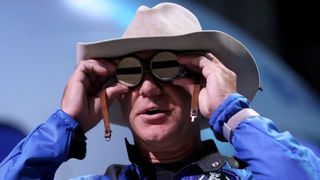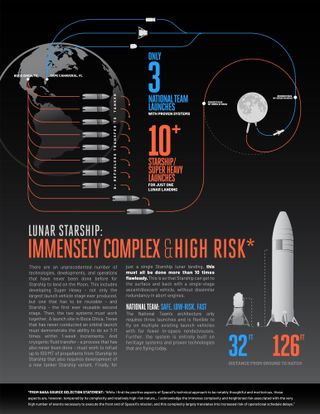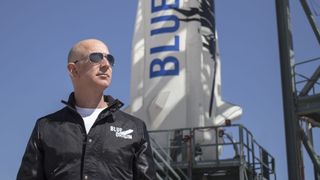Why Jeff Bezos' Blue Origin gets so much hate
Jeff Bezos' Blue Origin is missing one thing: public support. But why?

These days, it feels as though billionaire-backed space companies are launching off Earth all the time. So why does Jeff Bezos' Blue Origin seem to be in the hot seat?
Despite a summer of success, recent competition and some controversial tweets — including some misleading infographics — have left many who follow the space industry feeling less than supportive of Jeff Bezos and his space company.
Over the past few months, commercial spaceflight has launched into overdrive as companies like Axiom planned crewed missions to the International Space Station, SpaceX won NASA's Human Landing System (HLS) contract to build a moon lander and Blue Origin and Virgin Galactic successfully completed crewed suborbital flights with the companies' respective billionaire founders on board.
However, amidst a booming space sector, one company has drawn a majority of the ire — Blue Origin.
Related: Jeff Bezos' Blue Origin sues NASA over denied moon lander contract
Since Bezos founded the company in 2000, Blue Origin and its hardworking engineers and employees have been making progress with the company's many space technologies, including its New Shepard vehicle that lofted a crew of four passengers to space and back this July, and its upcoming New Glenn orbital vehicle.
Blue Origin's latest launch, which carried Bezos along with his brother Mark, 18-year-old Dutch student Oliver Daemen and pioneering aviator Wally Funk to and from suborbital space aboard New Shepard, was a turning point for the company. It was its first trip to space with passengers, a milestone that signified a step toward a future with regular launches of crews of paying customers, including space tourists.
Get the Space.com Newsletter
Breaking space news, the latest updates on rocket launches, skywatching events and more!
But this milestone, which put Blue Origin into the spotlight, also seems to have been a turning point for how the public views Bezos' company.
The July flight certainly didn't mark the first time that Blue Origin got major media attention. But the fact that it was a crewed launch (with a crew that included Bezos himself), and its temporal proximity to Virgin Galactic's crewed suborbital launch with its founder Richard Branson just over a week beforehand, shone a brighter light on the company.
All the wrong attention
"There is also a fair amount of backlash to the flights, and the industry more broadly, about the enormous costs of these flights," Christian Davenport, author of "The Space Barons" and space reporter for The Washington Post, told Space.com. "While these entrepreneurs are starting to take private citizens [to space], the passengers so far have been, by and large, extremely wealthy. That's raised questions about who ultimately is benefiting." (Bezos bought The Washington Post in 2013.)
Leading up to these suborbital flights and afterward, the public discourse on social media and even in traditional media and broadcast news networks has leaned heavily into discussing whether it is positive progress to see billionaires ride to space in the rockets their companies have built.
"Bezos has received some serious backlash in the last month, both because he is the richest person in the world, and his first real public spaceflight act was to get on a ship and rocket into space for his own gratification," author and senior space editor at Ars Technica Eric Berger told Space.com. "This underscores the criticism of commercial space as 'rich boys and their toys.'" (Berger's book "Liftoff: Elon Musk and the Desperate Early Days That Launched SpaceX" was published in March.)
Senator Elizabeth Warren (D-Mass.), who ran for president in 2020, publicly criticized Bezos
"Jeff Bezos can take a joy ride to space while he and other billionaires have gamed the system so they pay almost zero in taxes," Warren tweeted Aug. 18.
Jeff Bezos can take a joy ride to space while he and other billionaires have gamed the system so they pay almost zero in taxes. The best option to stop that is my two-cent #WealthTaxAugust 18, 2021
Though fellow billionaire Branson also took a suborbital trip courtesy of his own company in recent months, a lot of the negative discourse circles around just Bezos.
Aside from their space ventures, Bezos and other billionaire founders like Branson and SpaceX's Elon Musk have storied careers and histories that have garnered a wide variety of public opinions. However, recently, ongoing behavior by Bezos and competitive infographics put out by Blue Origin have prompted criticism of the company.

Sketchy infographics
Ahead of Blue Origin's crewed suborbital flight, the company published the first of several infographics that could be labeled "competitive" in the most polite of terms.
This first infographic, which Blue Origin tweeted July 9, displayed a side-by-side comparison showing the differences between Virgin Galactic's suborbital ride, called SpaceShipTwo, and Blue Origin's New Shepard. The infographic was posted just two days before Virgin Galactic's crewed suborbital flight on July 11.
From the beginning, New Shepard was designed to fly above the Kármán line so none of our astronauts have an asterisk next to their name. For 96% of the world’s population, space begins 100 km up at the internationally recognized Kármán line. pic.twitter.com/QRoufBIrUJJuly 9, 2021
Among the many attributes Blue Origin listed in the infographic, it specifically pointed to the fact that Blue Origin's flight would reach above the Karman line, an internationally recognized boundary of space 62 miles (100 kilometers) above Earth, while Virgin Galactic's flight would only reach above 50 miles (80 km), an altitude that merits astronaut wings by U.S. government agencies.
Related: Blue Origin throws shade at Virgin Galactic ahead of Richard Branson's launch

This infographic was followed by additional infographics that have poked at other space companies. For example, the latest one, which the company published on its website, called SpaceX's Starship deep-space vehicle "immensely complex" and "high risk."
"His [Bezos'] public relations tactic of employing infographics critical of SpaceX seems ham-fisted and tone deaf," Berger said.
HLS tug of war
The infographic depicting SpaceX's Starship points to another major point of contention sparked by Bezos and his company.
In April, NASA named SpaceX the sole winner of its Human Landing System (HLS) contract that will see the company build NASA's next moon lander, which will bring astronauts to the lunar surface as part of the agency's Artemis program. SpaceX, which will use Starship for the job, beat out Dynetics and the Blue Origin-led "National Team" for the contract.
NASA had previously stated that it would like to award more than one HLS contract so the Artemis program could benefit from competition and redundancy. But that wasn't a viable option given the relatively low levels of funding Congress has allocated for the HLS work, agency officials said in the wake of the contract announcement.
Instead of accepting NASA's decision, Blue Origin and Dynetics both filed protests with the U.S. Government Accountability Office. (Those protests were denied earlier this month.) And in July, Bezos penned an open letter to NASA Administrator Bill Nelson stating why Blue Origin should have won an HLS contract and suggesting that the selection wasn't conducted properly.
Related: NASA picks SpaceX's Starship to land Artemis astronauts on the moon

Bezos "has been criticized in the space community for his dogged protest of NASA's award of the Human Landing System contract" to SpaceX, Berger said.
In addition to the growing discourse over social media, publications including Popular Science are beginning to document this criticism.
"I don’t know if the public is paying attention to this, but the space community sure is and the space community is reacting very negatively," Laura Forczyk, who owns the aerospace consulting firm Astralytical, told Popular Science. "It’s seen as pettiness—as throwing a tantrum."
And the HLS saga has continued, with Blue Origin most recently deciding to file a lawsuit in the Court of Federal Claims against NASA over the selection, citing what the company describes as "NASA's unlawful and improper evaluation of proposals submitted under the HLS Option A BAA [broad agency announcement]," according to SpaceNews.
This lawsuit has actually halted work on the Artemis moon lander, with NASA volunteering to temporarily pause its HLS work with SpaceX because of the lawsuit, a NASA representative told SpaceNews.
And, amidst all of the trouble with the HLS contract, a Blue Origin engineer, Nitin Arora, who formerly worked for NASA, actually jumped ship to join SpaceX, he announced on LinkedIn.
"Bezos seems to have really strayed from the founding principles of Blue Origin," Berger said. "The public, and many in Congress, look at Blue Origin and Bezos and wonder why someone who is worth $200 billion is protesting and suing NASA for money to build a lunar lander."
"If it is that important to build a highway to space, then start building it," Berger added. "Government contracts will eventually follow if what you build serves a useful purpose."
The cherry on top
While Blue Origin as a company has fielded quite a bit of criticism with its infographics and multiple actions taken in response to NASA's HLS selection, the company's founder himself has also been in the crosshairs.
In addition to Bezos' public letter, the multiple actions taken by Blue Origin after losing the HLS contract and the company's controversial infographics, Bezos added yet another contentious item to the list on the day of his suborbital flight.
After landing back on Earth following the brief mission, Bezos and the rest of the New Shepard crew gathered for a livestreamed press conference. During the conference, Bezos, still clad in the large cowboy hat he wore to space, took just three questions from reporters before launching into discussing the flight. One post-flight comment from Bezos caught many peoples' ear:
"I also want to thank every Amazon employee and every Amazon customer, because you guys paid for all this," Bezos, who also founded Amazon, said to the crowd and livestream audience.
Even aside from Bezos' comment, the juxtaposition of Bezos' ride aboard the spaceflight and the continuing complaints about worker treatment at Amazon has raised questions and concerns.
"Tomorrow, Jeff Bezos will ride around on a rocketship for a little over 10 minutes. Amazon warehouse workers on 'megacycle' shifts will be on their feet for 10 hours. I’m fighting for an economy that values the dignity of their work, not the multiplication of his wealth," Congressman Andy Levin (D-Mich.) tweeted July 19, one day ahead of Bezos' launch.
Tomorrow, Jeff Bezos will ride around on a rocketship for a little over 10 minutes.Amazon warehouse workers on “megacycle” shifts will be on their feet for 10 hours.I’m fighting for an economy that values the dignity of their work, not the multiplication of his wealth.July 19, 2021
While criticism of billionaire space company founders isn't limited to just Bezos, "the main difference between Bezos and others, such as Musk and Branson," Berger said, "is that he has largely ignored the public and the media."
"Musk appears fairly regularly at news conferences or on teleconferences and interacts with people on Twitter all the time. Branson is fairly approachable in that he seems down to Earth. Bezos, by contrast, is standoffish," Berger added. "He rarely tweets and his Instagram account is clearly highly curated to reflect a certain image. This is not someone serious about engaging with the space community in a meaningful way."
But is "engaging with the space community" really necessary for a space company to succeed?
Is public image that important?
Certainly, the founder of a company doesn't need to be the most-liked person for the company to be successful. However, the aforementioned behavior by Bezos and Blue Origin could potentially jeopardize the company's future success.
While many companies have been lofting satellites into orbit for quite some time, "there aren't that many companies that are involved in that latter, human spaceflight piece," Michael López-Alegría, a former NASA astronaut and current vice president of business development at Axiom, told Space.com.
"And so each of them, I think — particularly between the two suborbital companies — they have to figure out how to differentiate themselves. And part of it's obvious because they're very different experiences," he said, referring to Virgin Galactic's space plane and Blue Origin's New Shepard rocket and capsule. "But I think beyond that … their branding and their approach to media is how they want to portray themselves."
"I think there's a huge market in suborbital space tourism, so as long as New Shepard can execute with safe and regular flights, I think that business will be profitable," Berger said.
However, now that Blue Origin "is starting to more aggressively go after government contracts, and as it starts flying private citizens, it will need to more effectively engage with the public," Davenport added. "The founders of the companies may claim that they don't pay close attention to public opinion, but members of Congress will. And since Congress oversees federal spending, they could have a huge role to play in the companies' futures."
Blue Origin has its next launch, an uncrewed flight of New Shepard called NS-17, coming up. This mission will lift off Aug. 26 for suborbital space before returning to Earth.
Email Chelsea Gohd at cgohd@space.com or follow her on Twitter @chelsea_gohd. Follow us on Twitter @Spacedotcom and on Facebook.
Join our Space Forums to keep talking space on the latest missions, night sky and more! And if you have a news tip, correction or comment, let us know at: community@space.com.

Chelsea “Foxanne” Gohd joined Space.com in 2018 and is now a Senior Writer, writing about everything from climate change to planetary science and human spaceflight in both articles and on-camera in videos. With a degree in Public Health and biological sciences, Chelsea has written and worked for institutions including the American Museum of Natural History, Scientific American, Discover Magazine Blog, Astronomy Magazine and Live Science. When not writing, editing or filming something space-y, Chelsea "Foxanne" Gohd is writing music and performing as Foxanne, even launching a song to space in 2021 with Inspiration4. You can follow her on Twitter @chelsea_gohd and @foxannemusic.
